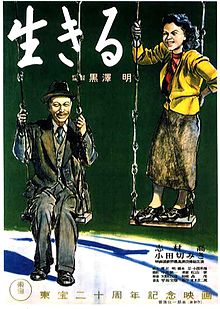| Ikiru | |
|---|---|
 Theatrical release poster | |
| Directed by | Akira Kurosawa |
| Screenplay by |
|
| Produced by | Sōjirō Motoki |
| Starring | |
| Cinematography | Asakazu Nakai |
| Edited by | Kōichi Iwashita |
| Music by | Fumio Hayasaka |
Production company | |
| Distributed by | Toho |
Release date |
|
Running time | 143 minutes |
| Country | Japan |
| Language | Japanese |
| Budget | $85,000[1] |
Ikiru (生きる, "To Live") is a 1952 Japanese tragedy film directed by Akira Kurosawa from a screenplay co-written with Shinobu Hashimoto and Hideo Oguni. The film examines the struggles of a terminally ill Tokyo bureaucrat (played by Takashi Shimura) and his final quest for meaning. The screenplay was partly inspired by Leo Tolstoy's 1886 novella The Death of Ivan Ilyich.
The film's major themes include learning how to live, the inefficiency of bureaucracy, and decaying family life in Japan, which have been the subject of analysis by academics and critics. Having won awards for Best Film at the Kinema Junpo and Mainichi Film Awards, it is considered one of the greatest films of all time.[2][3][4]
- ^ Films in Review. Vol. 4. National Board of Review. 1953. p. 290. Retrieved August 7, 2024 – via Google Books.
The outlay for Kurosawa's latest film, Living, was $85,000, which is more than twice the cost of Rashomon.
- ^ "The 100 Greatest Foreign Language Films". bbc. 29 October 2018. Archived from the original on 25 December 2020. Retrieved 10 January 2021.
- ^ Corliss, Richard (14 January 2010). "Ikiru". Time. Archived from the original on 2021-03-03. Retrieved 2021-03-24.
- ^ "Ikiru". bfi.org. Archived from the original on 2021-05-02. Retrieved 2021-05-02.